- Home
- David Gemmell
The Last Guardian Page 2
The Last Guardian Read online
Page 2
“Shir-ran!” bellowed Shannow. The lion twisted its head, and for a moment Shannow saw the light of understanding in its eyes … then it was gone. Again the beast leapt. A pistol shot thundered in the cave.
The creature that had been Shir-ran sank to the floor and rolled to its side, eyes locked to Shannow’s own. The Jerusalem Man moved forward and knelt by the body, laying his hand on the black mane.
“I am sorry,” he said. The eyes closed, and all breathing ceased.
Shannow laid aside his pistol and took up his Bible. “You saved my life, Shir-ran, and I took yours. That is not just, yet I had no choice. I do not know how to pray for you, for I do not know if you were man or beast. But you were kind to me, and for that I commend your soul to the All-High.” He opened his Bible.
Laying his left hand on Shir-ran’s body, he read, “The Earth is the Lord’s, and everything in it, the world, all who live in it, for he founded it upon the seas and established it upon the waters. Who may ascend the Hill of the Lord? Who may stand in his Holy Place? He who has clean hands and a pure heart, who does not lift up his soul to an idol, or swear by what is false.”
He walked to the trembling stallion and saddled him. Then he gathered what remained of the food, stepped into the saddle, and rode from the cave.
Behind him the fire flickered … and died.
2
THE CITY OF AD—9364 B.C.
THE TEMPLE WAS a place of great beauty still, with its white spires and golden domes, but the once-tranquil courtyards were now thronged with people baying for the blood sacrifice. The white tent at the entrance to the Holy Circle had been removed and in its place stood a marble statue of the king, regal and mighty, arms outstretched.
Nu-Khasisatra stood in the crowd, his limbs trembling. Three times the vision had come to him, and three times he had pushed it aside.
“I cannot do this, Lord,” he whispered. “I do not have the strength.”
He turned away from the spectacle as the victim was brought out and eased his way through the crowd. He heard the new high priest chant the opening lines of the ritual, but he did not look back. Tears stung his eyes as he stumbled along the corridors of white marble, emerging at last at the Pool of Silence. He sat at the pool’s edge; the roar of the crowd was muted there, yet still he heard the savage joy that heralded the death of another innocent.
“Forgive me,” he said. Gazing down into the pool, he looked at the fish swimming there and, above them, his own reflection. The face was strong and square, the eyes deep-set, the beard full. He had never considered it the face of a weak man. His hand snaked out, disturbing the water. The sleek silver and black fish scattered, carrying his reflection with them.
“What can one man do, Lord? You can see them. The king has brought them wealth and peace, prosperity and long life. They would tear me to pieces.” A sense of defeat settled upon him. In the past three months he had organized secret meetings, preaching against the excesses of the king. He had helped the outlawed priests of Chronos escape from the Daggers, smuggling them from the city. But now he shrank from the last commitment; he was ashamed that love of life was stronger than love of God.
His vision swam, the sky darkened, and Nu-Khasisatra felt himself torn from his body. He soared into the sky and hovered over the gleaming city below. In the distance a deeper darkness gathered, then a bright light shone beyond the darkness. A great wind blew, and Nu trembled as the sea roared up to meet the sky. The mighty city was like a toy now as the ocean thundered across the land. Huge trees disappeared under the waves like grass beneath a river flood. Mountains were swallowed whole. The stars flew across the sky, and the sun rose majestically in the west.
Looking down on the city of his birth, Nu-Khasisatra saw only the deep blue-gray of an angry sea. His spirit sank below the waves, deeper and deeper into the darkness. The Pool of Silence was truly silent now, and the black fish were gone. Bodies floated by him … men, women, tiny babes. Unencumbered by the water, Nu walked back to the central square. The statue of the king still stood with arms outstretched, but a huge black shark brushed against it. Slowly the statue toppled, striking a pillar. The head sheared off, and the body bounced against the mosaic tiles.
“No!” screamed Nu. “No!”
His body jerked, and once more he was sitting by the pool. Bright sunlight streamed above the temple, and doves circled the wooden parapets of the Wailing Tower. He stood, swept his sky-blue cloak over his shoulder, and marched back to the courtyard of the Holy Circle. The crowd was milling now, and the priests were lifting the victim’s body from the flat gray sacrifice stone. Blood stained the surface and had run down the carved channels to disappear through the golden vents.
Nu-Khasisatra strode to the steps and walked slowly toward the sacrifice stone. At first no one made a move to stop him, but as he drew nearer to the stone, a red-robed priest intercepted him.
“You cannot approach the Holy Place,” said the priest.
“What holy place?” countered Nu. “You have corrupted it.” He thrust the man aside and walked to the stone. Some people in the crowd had watched the altercation and now began to whisper.
“What is he doing?”
“Did you see him strike the priest?”
“Is he a madman?”
All eyes turned to the broad-shouldered man at the stone as he removed his blue cloak; beneath it he wore the white robes of a priest of Chronos. Temple guards gathered at the foot of the steps, but it was forbidden to carry a weapon to the Holy Place and they stood their ground, uncertain.
Three priests approached the man at the sacrifice stone.
“What madness is this?” asked one. “Why do you desecrate this temple?”
“How dare you speak of desecration?” countered Nu-Khasisatra. “This temple was dedicated to Chronos, Lord of Light, Lord of Life. No blood sacrifice was ever made here.”
“The king is the living image of Chronos,” the priest argued. “The conqueror of worlds, the lord of heaven. All who deny this are traitors and heretics.”
“Then count me among them!” roared Nu, and his huge hands took hold of the sacrifice stone and wrenched it clear of its supports. Forcing his fingers under the stone, he lifted it high above his head and hurled it out over the steps, where it shattered. An angry roar rose from the crowd.
Nu-Khasisatra leapt to stand on the altar base. “Faithless people!” he shouted. “The end of all days is upon you. You have mocked the Lord of Creation, and your doom will be terrible. The seas will rise against you, and not one stone will be left upon another. Your bodies will be dashed to the deep, and your dreams will be forgotten, even as you are forgotten. You have heard that the king is the living god. Blasphemy! Who brought the Rolynd Stones from the vault of heaven? Who led the chosen people to this bountiful land? Who dashed the hopes of the wicked in the Year of Dragons? It was Chronos, through his prophets. And where was the king? Unborn and unmade. He is a man, and his evil is colossal. He will destroy the world. You have wives and sons; you have loved ones. All will die. Not one of you listening to these words will be alive at the year’s end.”
“Drag him down!” shouted someone in the crowd.
“Kill him!” yelled another, and the cry was taken up by the mob.
The temple guards drew their swords and ran up the steps. Lightning seared among them, leaping from sword to sword, and the guards, their flesh blackened, toppled to the stone. A great silence settled on the crowd.
Smoke drifted up from the bodies of the guards as Nu-Khasisatra raised his hands to the heavens.
“There is no turning back now,” he said. “All will be as I have told it. The sun will rise in the west, and the oceans will thunder across the land. You will see the Sword of God in the heavens—and despair!”
He stepped down from the altar and walked slowly past the dead guards. The crowd parted before him as he marched from the temple.
“I recognize him,” said a man as he passed by. “That was Nu-Khas
isatra the shipbuilder. He lives in the south quarter.”
The name was whispered among the mob and carried from the temple, coming at last to the woman Sharazad.
And the hunt began.
3
FOR THREE DAYS Shannow traveled south, the trails winding ever down into a long valley of half-frozen streams and tall stands of pine, wide meadows and rolling hills. He saw little game but came across the tracks of deer and elk. Each day around midmorning he would halt in a spot shielded from the wind and clear the snow from the grass, allowing the stallion to eat while Shannow himself sat by a small fire reading his Bible or thinking about the journey ahead.
His wounds were healing fast; Shir-ran had done a fine job on them. He thought of the strange man-beast often and came to the conclusion that Shir-ran had wanted his company for just the purpose it had served. The man-beast had stitched his wounds, then left his guns by his side. Yet within the sanctuary of the cave he had had no need of weapons. The doomed creature had spoken of the Change, and it had been awesome to witness—the move from humanity to bestiality. What could cause such a transformation Shannow had no idea, but in the strange world after Armageddon there were many mysteries.
Two years before, in a bid to rescue Samuel Archer and the reformed Hellborn Batik, Shannow had seen at first hand a new race of people called Wolvers, part man and part animal. Archer himself had spoken of other such creatures, though Shannow had yet to see them.
It was warmer here in the valley, and as he moved farther south, the snow thinned, great patches of verdant grass shimmering on the hillsides. Every day Shannow scanned the skies, looking for the signs of wonder. But always the heavens remained blue and clear.
On the fourth day, as dusk gathered, Shannow guided the stallion into a wood, seeking a campsite. Ahead, through the tall trees, he glimpsed a glittering fire.
“Hello, the camp!” he yelled. At first there was no answer, then a gruff voice called out, beckoning him in. Shannow waited for a moment and then delved into his pack, bringing out the short-nosed percussion pistol and tucking it into his belt just inside the flap of his long coat. Then he rode forward.
There were four men sitting around the fire and five horses tethered to a picket line. Shannow stepped from the saddle and tied his stallion’s reins to a jutting root. On the fire a large black pot was hanging from a tripod, and within it Shannow could smell a simmering broth. Casually he moved to the fire and squatted down, his eyes sweeping the group. They were hard men, for the most part lean and wolflike; Shannow had known men like them all his life. His gaze halted on a burly, round-shouldered man with a short-cropped salt-and-pepper beard and eyes that were merely slits under heavy lids.
There was tension in the air, but it did not affect the Jerusalem Man, though he acknowledged it. His eyes locked to the burly man, and he waited.
“Eat,” said the man at last, his voice low.
“After you,” said Shannow. “I would not wish to be impolite.”
The man smiled, showing stained teeth. “The wilderness is no place for manners.” He reached out and ladled some broth into a metal dish, and the others followed suit.
As the tension grew, Shannow took a dish with his left hand and placed it before the fire. Then, still with his left hand, he lifted the ladle and filled the bowl, drawing it to him. Slowly he finished the meal and pushed the plate from him.
“Thank you,” he said into the silence. “It was most welcome.”
“Help yourself to more,” offered the leader.
“No, thank you. There will not be enough left for your scout.”
The leader swung around. “Come in, Zak; supper’s waitin’!” he called.
Across from the fire a young man rose from the bushes, a long rifle in his hands. He walked slowly to the fire, avoiding Shannow’s gaze, and sat beside the leader with the rifle by his side.
Shannow rose and moved to his stallion, untying his blanket roll and spreading his bed beside the horse. Loosening the cinch, he lifted the saddle and dropped it to the ground; then, taking a brush from his saddlebag, he ducked under the stallion’s neck and groomed the horse with smooth even strokes. He did not look at the men around the fire, but the silence grew. The Jerusalem Man had been tempted to finish his meal and ride on, to be clear of the immediate danger, but such a move would have been foolish, he knew. These men were brigands and killers, and to ride on would display weakness like the scent of blood to a wolfpack. He patted the stallion’s neck and returned to his bed. Without a word to the men he removed his hat and lay down, pulling a blanket over him and closing his eyes.
At the fire the young man reached for his rifle, but the leader gripped his arm and shook his head.
The youth pulled his arm clear. “What the Devil’s wrong with you?” he whispered. “Let’s take him now. That there is one hell of a horse, and his guns … you see them guns?”
“I saw,” answered the leader, “and I saw the man who wears ’em. You see how he rode in? Careful. He spotted you rightaways and hunkered down where you couldn’t get no shot. And all through the meal he only used his left hand. And where was his right? I’ll tell you where. It was inside that long coat, and it weren’t scratching his belly. Now, you leave it be, boy. I’ll think on it.”
Toward midnight, with all the men asleep in their blankets, the youth rose silently, a double-edged knife in one hand. He crept forward toward where Shannow slept. A dark figure loomed behind him, and a pistol clubbed across the youth’s neck; he fell without a sound. The leader holstered his pistol and dragged the boy back to his blankets.
Twenty feet away Shannow smiled and returned his own gun to its scabbard.
The leader walked across to him. “I know you ain’t asleep,” he said. “Who the hell are you?”
Shannow sat up. “That boy will have a sore head. I hope he has sense enough to thank you for it.”
“The name’s Lee Patterson,” the man answered, thrusting out his right hand. Shannow smiled at him but ignored the offer.
“Jon Shannow.”
“Jesus God Almighty! You hunting us?”
“No. I’m riding south.”
Lee grinned. “You wanna see them statues in the sky, eh? The Sword of God, Shannow?”
“You have seen them?”
“Not me, man. They call that the Wild Lands. There’s no settlements there, no way for a man to make a living. But I seen a man once who swore he’d stood under ’em; he said it gave him religion. Me, I don’t need no religion. You sure you’re not huntin’ us?”
“You have my word. Why did you save the boy?”
“A man don’t have too many sons, Shannow. I had three. One got killed when I lost my farm. Another was shot down after we … took to the road. He was hit in the leg; it went bad, and I had to cut it from him. Can you imagine that, Shannow, cutting the leg from your son? And he died anyway, ’cause I left it too long. It’s a hard life, and no mistake.”
“What happened to your wife?”
“She died. This is no land for women; it burns them out. You got a woman, Shannow?”
“No. I have no one.”
“I guess that’s what makes you dangerous.”
“I guess it does,” Shannow agreed.
Lee stood and stretched. He looked down. “You ever find Jerusalem, Shannow?”
“Not yet.”
“When you do, ask Him a question, will you? Ask Him what the hell is the point of it all.”
4
NU-KHASISATRA RAN FROM the temple, out onto the broad steps, and down into the teeming multitudes that thronged the city thoroughfares. His courage was exhausted, and reaction had set in; his limbs were trembling as he pushed his way through the crowds, trying to lose himself among the thousands who packed the market streets.
“Are you a priest?” a man asked him, clutching his sleeve.
“No,” snapped Nu. “Leave me alone!”
“But you wear the robes,” the man persisted.
“
Leave me!” roared Nu, wrenching the man’s hand from him. Once more swallowed by the throng, he cut left into an alleyway and walked swiftly through to the Street of Merchants. There he bought a heavy cloak; it had a deep hood, which he pulled over his dark hair.
He stopped at an eating house on the crossroads corner, taking a table by the east window, where he sat staring out onto the street, overwhelmed by the enormity of his deed. He was a traitor and a heretic. There was nowhere in the empire to hide from the wrath of the king. Even now the Daggers would be hunting him.
“Why you?” Pashad had demanded the previous night. “Why can your god not use someone else? Why must you throw away your life?”
“I do not know, Pashad. What can I say?”
“You can give up this foolishness. We will move to Balacris, put this nonsense behind us.”
“It is not nonsense. Without God I am nothing. And the king’s evil must be opposed.”
“If your Lord Chronos is so powerful, why does he not strike the king dead with a thunderbolt? Why does he need a shipbuilder?”
Nu shrugged. “It is not for me to question Him. All I have is His. All the world is His. I have been a temple student all my life—never good enough to be a priest. And I have broken many of His laws. But I cannot refuse when He calls upon me. What kind of a man would I be? Answer me that.”
“You would be a live man,” she said.
“Away from God there is no life.” He saw the defeat in her dark eyes, saw it in the bright tears that welled and fell to her cheeks.
“What of me and the children? A traitor’s wife suffers his fate—have you thought of that? Do you wish to see your own children burning in the fires?”
“No!” The word was torn from him in a cry of anguish. “You must get away from here, beloved. You must! I spoke to Bali this afternoon, and he says you can go to him tomorrow night; he has something for you.”

 Bloodstone
Bloodstone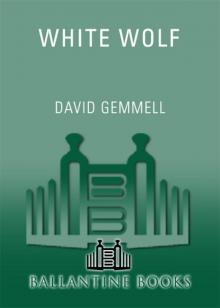 White Wolf
White Wolf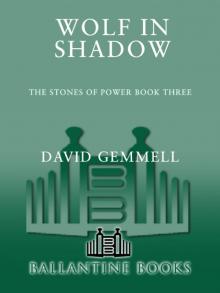 Wolf in Shadow
Wolf in Shadow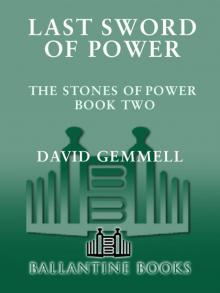 Last Sword of Power
Last Sword of Power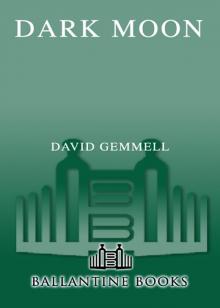 Dark Moon
Dark Moon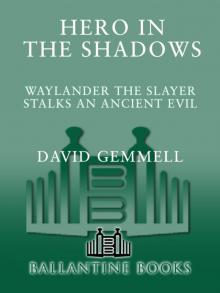 Hero in the Shadows
Hero in the Shadows Gemmell, David - Drenai 09 - Hero In The Shadows
Gemmell, David - Drenai 09 - Hero In The Shadows Waylander
Waylander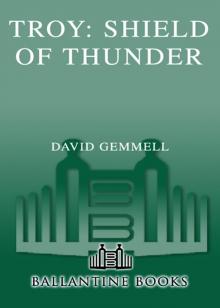 Shield of Thunder
Shield of Thunder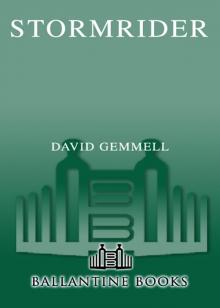 Stormrider Stormrider
Stormrider Stormrider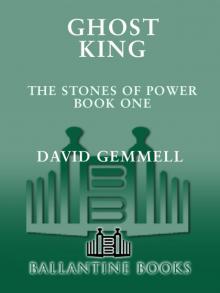 Ghost King
Ghost King Legend
Legend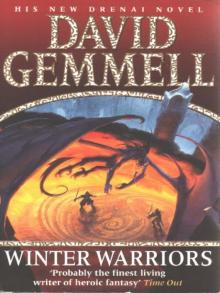 Winter Warriors
Winter Warriors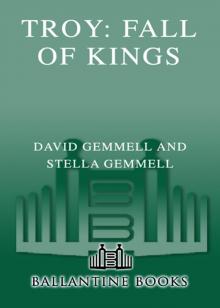 Fall of Kings
Fall of Kings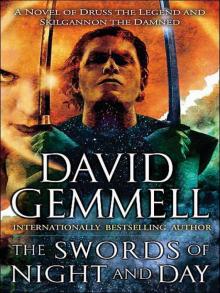 The Swords of Night and Day
The Swords of Night and Day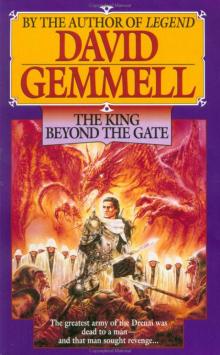 The King Beyond the Gate
The King Beyond the Gate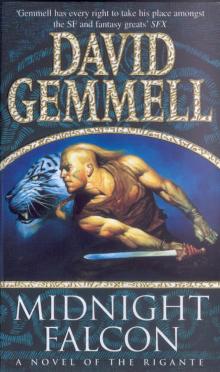 Midnight Falcon
Midnight Falcon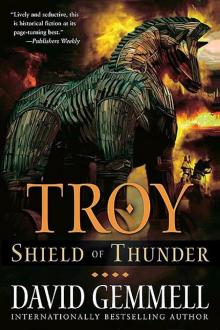 02 - Shield of Thunder
02 - Shield of Thunder In the Realm of the Wolf
In the Realm of the Wolf Ravenheart
Ravenheart The First Chronicles of Druss the Legend
The First Chronicles of Druss the Legend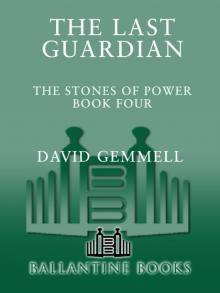 Last Guardian
Last Guardian Stormrider
Stormrider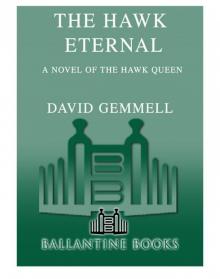 The Hawk Eternal
The Hawk Eternal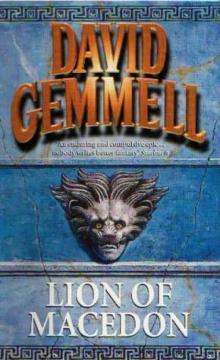 Lion of Macedon
Lion of Macedon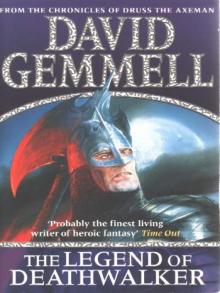 The Legend of Deathwalker
The Legend of Deathwalker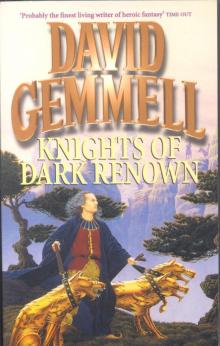 Knights of Dark Renown
Knights of Dark Renown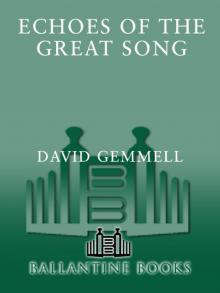 Echoes of the Great Song
Echoes of the Great Song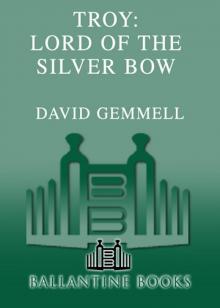 Lord of the Silver Bow
Lord of the Silver Bow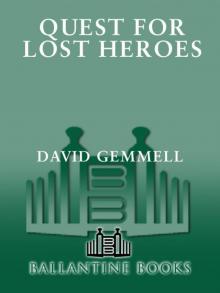 Quest for Lost Heroes
Quest for Lost Heroes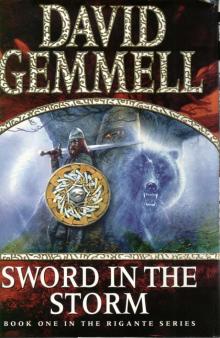 Sword in the Storm
Sword in the Storm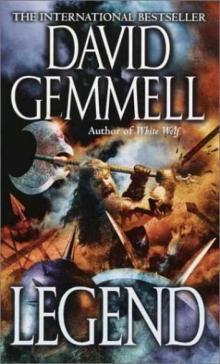 Drenai Saga 01 - Legend
Drenai Saga 01 - Legend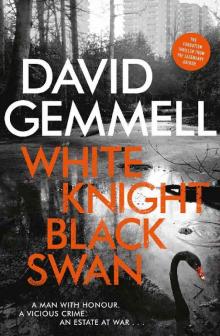 White Knight/Black Swan
White Knight/Black Swan![[Troy 02] - Shield of Thunder Read online](http://i1.bookreadfree.com/i/03/19/troy_02_-_shield_of_thunder_preview.jpg) [Troy 02] - Shield of Thunder
[Troy 02] - Shield of Thunder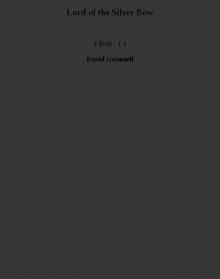 Lord of the Silver Bow t-1
Lord of the Silver Bow t-1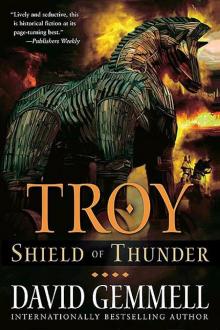 Shield of Thunder t-2
Shield of Thunder t-2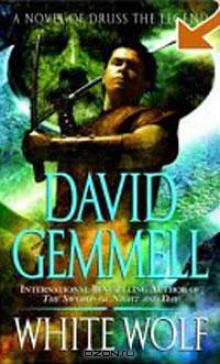 White Wolf: A Novel of Druss the Legend dt-10
White Wolf: A Novel of Druss the Legend dt-10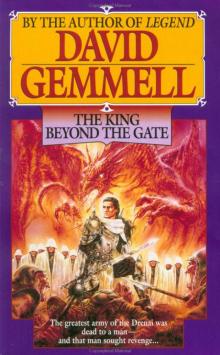 Drenai Saga 02 - The King Beyond the Gate
Drenai Saga 02 - The King Beyond the Gate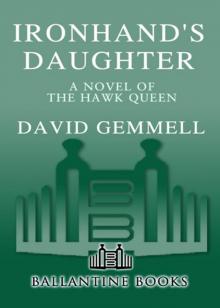 Ironhand's Daughter
Ironhand's Daughter Gemmell, David - Drenai 06 - The First Chronicles of Druss the Legend
Gemmell, David - Drenai 06 - The First Chronicles of Druss the Legend The Last Guardian
The Last Guardian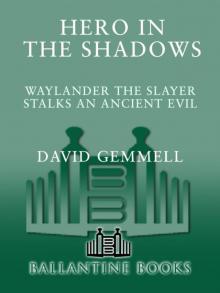 Hero in the Shadows: A Waylander the Slayer Novel
Hero in the Shadows: A Waylander the Slayer Novel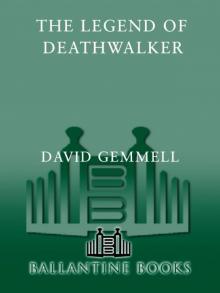 The Legend of the Deathwalker
The Legend of the Deathwalker